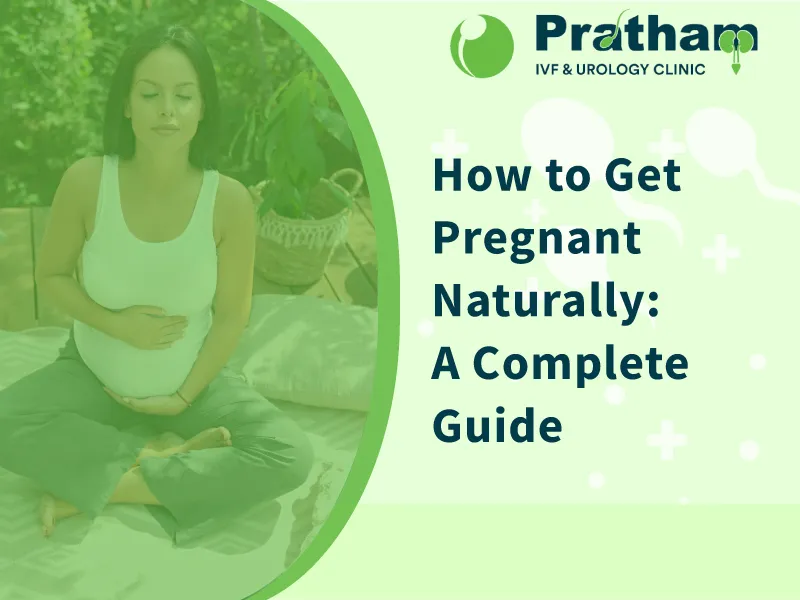
Guide to Getting Pregnant Naturally
Natural pregnancy is a wonderful journey that involves a number of complex yet intriguing processes. For couples attempting to start a family, it may seem obvious at first, but it is important to understand the underlying biological processes and variables that can affect conception. This investigation will focus on the normal course of conception, the variables influencing fertility, and some practical advice for individuals hoping to become pregnant naturally.
If you're considering assisted reproductive techniques like IVF, understanding natural conception is the first step towards your fertility journey.
The Journey to Natural Pregnancy
The process of getting pregnant begins long before you even realize it. It involves the delicate interplay of hormones, timing, and physical health in both partners. Here's a breakdown of the steps involved in natural conception:
-
Hormonal Balance
For natural conception, both partners need a proper balance of reproductive hormones. In women, hormones like estrogen and progesterone regulate the menstrual cycle, making sure that the ovary releases a mature egg during ovulation. For men, testosterone is vital for the production of healthy sperm. Any imbalance in these hormones can disrupt the process of ovulation or sperm production, leading to difficulties in conceiving naturally.
-
Ovulation
Ovulation is a critical event in a woman's menstrual cycle, where the ovary releases one mature egg. This egg is then swept into one of the nearby fallopian tubes, where it awaits fertilization. Timing is important here because the egg must be fertilized within 12 to 24 hours after its release. For those struggling with ovulation-related issues, it might be beneficial to consult an IVF specialist doctor like Dr. Dharmesh Kapadia, a renowned IVF expert at Pratham IVF. Understanding your ovulation cycle can also help you pinpoint the best time to conceive naturally.
-
Sperm Journey
During intercourse, millions of sperm are ejaculated into the vagina. From there, the sperm must navigate through the cervix, uterus, and into the fallopian tubes to meet the egg. This journey is challenging, and only a few sperm reach the egg. But, when a healthy sperm meets the egg, fertilization can occur, leading to the formation of a single-cell zygote. For men facing fertility issues, consulting a Male Infertility expert can be an essential step. Infertility in men can often be addressed with proper infertility treatment, allowing for a higher chance of natural conception.
-
Fertilization and Zygote Formation
When the sperm successfully meets the egg in the fallopian tube, they attach to one another, resulting in fertilization. This fertilization process creates a single-cell zygote, which contains the genetic material from both parents. This zygote then begins its journey toward the uterus.
The Role of Lifestyle in Natural Conception
While the biological processes are fundamental, lifestyle factors play a significant role in natural conception. Maintaining a healthy lifestyle can increase your chances of getting pregnant naturally.
-
Diet and Nutrition
A balanced diet rich in vitamins, minerals, and antioxidants is important for both partners. Foods rich in folic acid, zinc, and omega-3 fatty acids support reproductive health. For example, leafy greens, nuts, seeds, and fatty fish are excellent sources of these nutrients. For those seeking to optimize their diet for fertility, an IVF specialist can provide personalized advice. In cases where natural conception proves challenging, IVF medicine may be recommended by your fertility expert.
-
Exercise
Regular physical activity helps maintain a healthy weight, which is important for fertility. Obesity or being underweight can disrupt hormonal balance, affecting ovulation and sperm production. But, excessive exercise can also have a negative impact, so it's important to find a balance.
An IVF specialist doctor can provide guidance on the appropriate level of physical activity for those trying to conceive, whether naturally or through infertility treatment.
-
Avoiding Harmful Substances
Smoking, excessive alcohol consumption, and recreational drugs can significantly reduce fertility in both men and women. These substances can damage eggs and sperm, making it harder to conceive. It's advisable to avoid these harmful substances entirely if you're trying to get pregnant naturally. If you've been exposed to such substances and are facing difficulties in conceiving, consulting a Male Infertility expert or IVF expert like Dr. Dharmesh Kapadia at Pratham IVF can be an important step toward understanding your fertility options.
Common Challenges in Natural Conception
While many couples conceive naturally without any issues, others may face challenges. Understanding these challenges can help you make informed decisions about your fertility journey.
-
Age and Fertility
Age is a significant factor in fertility. Women's fertility begins to decline in their late 20s and decreases more rapidly after the age of 35. Men's fertility also declines with age, but at a slower rate. For couples where age is a factor, consulting with an IVF expert or IVF specialist doctor like Dr. Dharmesh Kapadia at Pratham IVF can provide insights into your fertility and potential treatments.
-
Medical Conditions
Certain medical conditions, such as polycystic ovary syndrome (PCOS), endometriosis, or blocked fallopian tubes, can make natural conception difficult. In men, conditions like low sperm count or motility can be barriers to conception. If you suspect a medical condition is affecting your fertility, seeking advice from a fertility expert is essential. They can guide you on the appropriate infertility treatment or whether IVF might be a suitable option.
-
Stress and Mental Health
Stress can negatively impact your fertility by disrupting hormone production and ovulation. While it's easier said than done, finding ways to manage stress, such as through yoga, meditation, or counseling, can improve your chances of getting pregnant naturally. If stress is a significant issue, your IVF specialist may recommend specific stress management techniques to support your fertility journey.
When to Seek Help
While many couples conceive naturally within a year of trying, others may need medical assistance. Here are some signs that it might be time to consult a fertility expert:
-
Age: If you're over 35 and have been trying for six months without success, it's advisable to seek help.
-
Irregular Periods: If your menstrual cycles are irregular or absent, it could be a sign of an underlying issue that needs medical attention.
-
Previous Miscarriages: If you've had multiple miscarriages, a fertility evaluation might be necessary.
-
Male Fertility Issues: If there are known issues with sperm count, motility, or morphology, consulting a Male Infertility expert is important.
Pratham IVF, led by Dr. Dharmesh Kapadia, offers complete fertility services, including IVF and other infertility treatments. Whether you're just beginning your journey or have been trying for some time, our team is here to support you.
Conclusion
Take Charge of Your IVF Journey with the Right Nutrition
The process of becoming pregnant organically is challenging yet rewarding. You can dramatically improve your chances of getting pregnant by being aware of the biological processes involved, leading a healthy lifestyle, and coordinating your efforts. But remember that assistance is available if you're having difficulties. Seeking advice from an IVF doctor or fertility expert can provide you the direction and treatment choices you require.
For more information about natural conception and fertility treatments like IVF, please , please call us at +91 98797 80105 or mail us at prathamivf@gmail.com. Pratham IVF is here to support you every step of the way on your journey to parenthood.
 Ahmedabad Top Rated IVF Center
Ahmedabad Top Rated IVF Center




